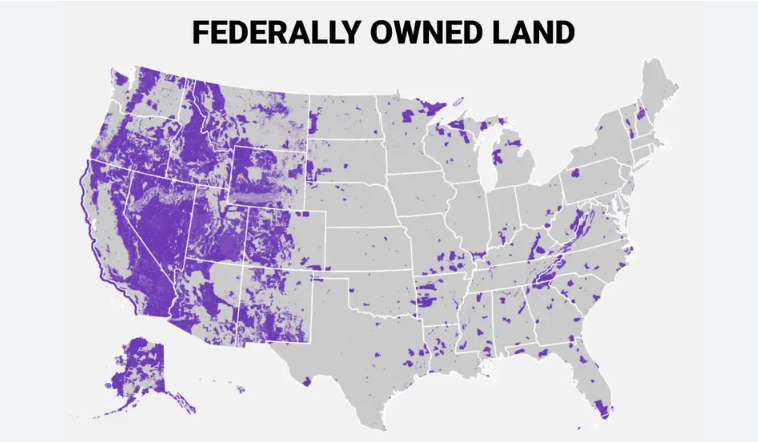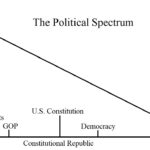By Douglas V. Gibbs
President Donald Trump is actively pursuing plans to sell federal properties to private buyers, particularly underutilized buildings and public lands, as part of a broader effort to shrink the federal government’s footprint and raise funding. Senator Joni Ernst introduced the Disposal Act, which lists six prime properties in Washington D.C. for immediate sale. The bill aims to cut through bureaucratic red tape and fast-track the sale of underused government buildings. The Trump administration previously published a list of over 440 federal buildings targeted for closure or sale, including major sites like the FBI headquarters and DOJ building. Though the list has been revised a few times, and then ultimately was later removed from public release, the existence of it in the first place signals serious intent to sell federal properties to private buyers.
A sovereign wealth fund has been proposed by President Trump, which would serve as a U.S. Government savings account separate from the General Fund of the U.S. Treasury. The General Fund is used for government’s day-to-day operations like one’s checking account to pay bills. But the sovereign wealth fund would be more like an investment portfolio meant to build long-term wealth. Rather than operating like the General Fund which simply collects taxes, spends them, and borrows into debt, the sovereign wealth fund would invest money, investing to grow national wealth. Norway, for example, uses oil money to invest globally and earns billions. The sovereign wealth fund would be fed by monies from natural resource revenues or budget surpluses, generating economic benefits that would grow the country’s wealth, stabilize the economy, and create a pool of money that can be tapped into for long-term priorities like pensions, infrastructure, or debt reduction. President Trump, after all, is a businessman, so he’s treating Uncle Sam like a potentially smart investor, hoping to make money for America rather than just collecting and spending taxes. The initial funding of the sovereign wealth fund would come from the sale of federal land and buildings, particularly large tracts of federal real estate in the western United States. While still in early stages, the idea reflects a shift toward leveraging government-owned assets rather than relying solely on taxation or borrowing.
The grand plan is to downsize government operations and reduce costs, while growing its assets. To accomplish the feat the General Services Administration (GSA) reportedly plans to sell half of the federal property it manages, aligning with Trump’s push for a sovereign wealth fund. The move initially was designed to coincide with a 90-day hiring freeze for federal agencies. Shortly after taking office President Trump did implement a federal hiring freeze, but it did not last the full 90 days in practice. It actually lasted about 79 days before being replaced by new bureaucratic guidance. Trump has moved to institute another hiring freeze, and wants restrictions on new hiring to become a continuing policy rather than a temporary measure. Along with the freeze Trump is continuing the effort to bring federal employees back to in-person work.
The offloading of federal properties may help in reversing the unconstitutional trend of a federal land grab, or at least that’s the way it seems on the surface. The federal government’s history of extortion against the States in the west which included retaining federal land possession as a condition of statehood, along with other land grabs that include National Park policies, violates Article I, Section 8, Clause 17. So one must then ask, is it constitutional for the federal government to sell property that was unconstitutionally obtained in the first place?
Some of my opponents may also raise concerns about the purpose of conservation behind the ownership of many of these lands in question. With that in mind, I am not saying that land should not be set aside in certain cases for conservation. As a Christian I am a firm believer in being good stewards of our planet. I also recognize the biblical wisdom of Jeremiah 17:9, “The heart is deceitful above all things, And desperately wicked; Who can know it?” The verse essentially reminds us that if we operate on feelings alone our hearts will guide us in a wicked direction. It is important for us as humans with a flawed human nature to also take into consideration a pragmatic way of looking at things, use our discernment, logic, common sense and critical thinking.
I also wrestle with the fact that establishing a sovereign wealth fund may teeter on the edge of constitutionality, and many of the mechanisms attached to the idea are downright unconstitutional for sure. When it comes to the ownership of properties the Constitution is clear that such ownership is limited to what is necessary for “needful buildings” like forts, arsenals, dockyards, and other government functions with state legislature consent. The only exception would be properties obtained from foreign sources by way of treaty.
Historically, Article I, Section 8, Clause 17 of the Constitution, the part that defines that federal properties must be obtained by purchase, consent of the states, and for needful buildings has been stretched by federal agencies to justify vast land holdings, especially in western states, where the federal government owns over 50% of land in states like Nevada. Federal land grabs violate the Founding Fathers’ intent, especially when lands are held indefinitely without fulfilling the “needful” purpose.
Trump’s active exploration of selling federal lands, particularly underused parcels managed by agencies like the Bureau of Land Management (BLM) and the Department of Housing and Urban Development (HUD), could be seen as a move that could also reverse much of the consequences of the federal government violating the Constitution in the past with massive land grabs. A joint task force has been formed to identify parcels suitable for affordable housing development or other designs for land use, but unfortunately no formal restrictions or conditions are being considered. While I am not a fan of the federal government owning so much land or over-regulating in the private sphere, I am concerned that once these lands are transferred to private ownership there may be issues that will arise regarding environmental protections, public access, or the lands only being used for accessing particular resources or the reality that real estate developers may use their ownership of the land to prioritize profit over common sense public interest. Liberty is a wonderful thing, and private ownership should be unaffected largely by federal regulations, but at the same time I understand the concerns of those who fear misuse of the property by private actors. For fear of going in one direction too far, I want to make sure we don’t lurch too far in the opposite direction and confirm the fears of those who believe we must be good stewards of our world.
President Andrew Jackson comes to mind when I think about Trump’s strategy. Jackson successfully paid off the national debt in 1935, though only briefly, by selling off federal lands aggressively. We have been in debt ever since, providing evidence of government’s inability to remain within its means. Nonetheless, Trump’s strategy mirrors Jackson’s actions in spirit, aiming to reduce the deficit and shrink federal bureaucracy by liquidating assets. But, unlike Jackson, today’s federal holdings are entangled in environmental, tribal, and recreational claims, making the process far more complex.
As a constitutionalist I seek constitutional fidelity, but with an eye on reality I also want to make sure we are fiscally pragmatic and that we are mindful about environmental and cultural stewardship. If President Trump, or any administration, were to pursue the sale of lands it would require a multipronged strategy rooted in consent of the States, constraint, and covenant.
I believe that the sale of federal land is capable of being a good idea, but the state legislatures’ consent regarding the provisions attached to those sales must be included. Depending upon the nature of the lands in question, their locations, or other factors the deeds should contain appropriate restrictions that would prohibit unfettered development in certain situations, especially concerning environmental degradation, or displacement of tribal or historical sites. If the land is misused or left undeveloped beyond a set period, the ownership should then revert to the State. All transactions must be fully transparent, publicly disclosed and subject to review with citizen input. Sales to foreign buyers must be disallowed, though leasing ought to be considered if the use of the land will be for reasons tied to manufacturing or other supply-side activities. Rather than selling to the highest bidder, selling to state governments or tribal nations should be the first opportunity so that they may reclaim or repurpose the land. That part of my list of demands is a tough pill for me because at the same time I must consider that if the federal government obtained the properties in question unconstitutionally in the first place, ought not the properties in question be simply given back to the states? Selling it back to the states, rather than simply transferring ownership back to the states without a condition of payment is sort of like someone stealing something from you, but out of the goodness of their heart giving you the opportunity to buy it back from them.
The reality of the current situation, taking a practical approach that takes into consideration all of the modern nuances and the whole purpose of the federal government unloading the properties for the purpose of debt reduction, however, changes the dynamic which will likely demand that none of the parties involved may consider a true constitutional approach in the first place. I’m not saying that we ought to abandon the Constitution because that’s the way it has been all along. I am simply reminding myself that operating truly in a constitutional manner regarding the whole sovereign wealth fund idea may not be a battle we are capable of winning at this juncture so we might wish to tackle what we can accomplish – slightly moving the constitutional needle in the originalist direction.
The overall benefit these actions may pose for the United States at large is the goal here, I believe. And with that in mind, we may even consider a modernized version of the Homestead Act, offering land to individuals or families who commit to productive use that is beneficial to the country, such as farming or other agricultural operations, or other productive uses we may have not thought of. The monies from the sales, if that were the path, and if we wish to remain true to President Trump’s aims, must then be earmarked only for debt reduction, not general spending. I don’t want the sovereign wealth fund, if it does in fact find a way to pop into existence, to just create another piggy bank for high-spending politicians to raid with ease. A constitutional land commission may even need to be created, empowered to review, approve and audit all land sales for constitutional compliance and common sense public benefit.
As a historian I don’t view these lands as just real estate. Those lands are tied to the past, and can be a gift to the future. President Trump ought to not frame the move as liquidation as much as a move in the direction of the restoration of constitutional order, returning land to the states, the people, and the purposes for which those lands were originally supposed to be used for.
The idea is a good one on the surface, but history tells us that the political class will not behave itself if the proper checks and balances are not inserted. If we don’t step through this potentially explosive minefield properly, it could become a game of political favoritism, risky speculation, and a hindrance to long-term growth rather than a vehicle to provide an important investment strategy for the future. Yes, President Trump, I understand what you wish to do if the U.S. sells some of its federal properties. I would rather the federal government just transfer the lands to their original owners be it the states or tribal nations, but perhaps we can at least make the States and tribal nations the first potential buyers. Give them, in a sense, the first right of refusal. Then, once the sales begin to happen, let’s make sure conditions are attached so that it doesn’t become a nightmare. And in the end, we may get closer to the lands being constitutionally distributed, and get rid of the national debt at the same time. All it takes is discipline, common sense discernment, and a sharp eye on the Constitution – but I know history, and the greedy tendencies of politicians – so I am not going to hold my breath too long regarding the consideration on the table.
— Political Pistachio Conservative News and Commentary



